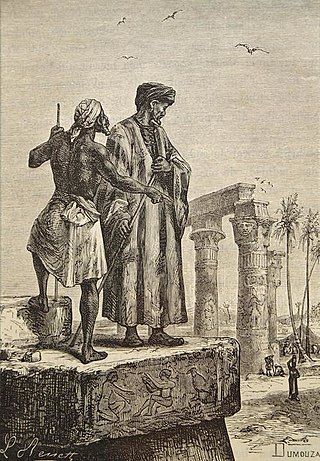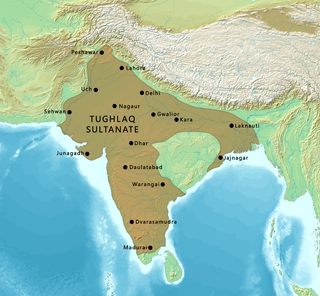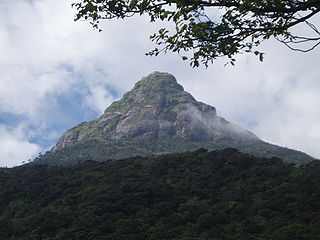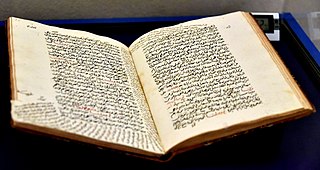
Abu Abdullah Muhammad ibn Battutah, commonly known as Ibn Battuta, was a Maghrebi traveller, explorer and scholar. Over a period of thirty years from 1325 to 1354, Ibn Battuta visited most of North Africa, the Middle East, East Africa, Central Asia, South Asia, Southeast Asia, China, the Iberian Peninsula, and West Africa. Near the end of his life, he dictated an account of his journeys, titled A Gift to Those Who Contemplate the Wonders of Cities and the Marvels of Travelling, but commonly known as The Rihla.

Aligarh is a city in the state of Uttar Pradesh in India. It is the administrative headquarters of Aligarh district, and lies 342 kilometres (213 mi) northwest of state capital Lucknow and approximately 130 kilometres (81 mi) southeast of the capital, New Delhi. The cities and districts which adjoin Aligarh are: Gautam Buddha Nagar, Bulandshahr, Sambhal, Badaun, Kasganj, Hathras, Etah and Mathura. As of 2011, Aligarh is the 53rd most populous city in India.

Sarai was the name of possibly two cities near the lower Volga, that served successively as the effective capitals of the Golden Horde, a Turco-Mongol kingdom which ruled much of Northwestern Asia and Eastern Europe, in the 13th and 14th centuries. There is considerable disagreement among scholars about the correspondence between specific archaeological sites and the various references to Sarāy, Sarāy-i Bātū, Sarāy-i Barka, Sarāy al-Jadīd, and Sarāy al-Maḥrūsah in the historical sources.

Islam is the state religion of Maldives. The 2008 Constitution or "Fehi Gānoon" declares the significance of Islamic law in the country. The constitution requires that citizenship status be based on adherence to the state religion, which legally makes the country's citizens 100% Muslim.

Oualata or Walata is a small oasis town in southeast Mauritania, located at the eastern end of the Aoukar basin. Oualata was important as a caravan city in the thirteenth and fourteenth centuries as the southern terminus of a trans-Saharan trade route and now it is a World Heritage Site.

The Tughlaq dynasty was the third dynasty to rule over the Delhi sultanate in medieval India. Its reign started in 1320 in Delhi when Ghazi Malik assumed the throne under the title of Ghiyath al-Din Tughluq. The dynasty ended in 1413.

Aligarh district is a district in the state of Uttar Pradesh, India. This district is a part of Aligarh Division. The districts which adjoin Aligarh are Gautam Buddha Nagar, Bulandshahr, Sambhal, Badaun, Kasganj, Hathras and Mathura.
Urduja was a legendary warrior princess recorded in the travel accounts of Ibn Battuta. She was described to be a princess of Kaylukari in the land of Tawalisi. Though the locations of Kaylukari and Tawalisi are disputed, in the Philippines, Urduja is believed by modern Filipinos to be from Pangasinan, and has since been regarded as a national heroine.
Jalali is a town and a nagar panchayat in Aligarh district in the Indian state of Uttar Pradesh.
Tijara is a city and a municipality in Khairthal-Tijara district of the Indian state of Rajasthan. Tijara comes under the NCR area and is situated 55 km to the northeast of Alwar. The nearest railway station to Tijara is Khairthal. Bhiwadi is a census town in Tijara. It is the biggest industrial area of Rajasthan and part of the historical Ahirwal Mewat region. Tijara is dominated by Yadav and Meo community.

İznik is a municipality and district of Bursa Province, Turkey. Its area is 753 km2, and its population is 44,236 (2022). The town is at the site of the ancient Greek city of Nicaea, from which the modern name derives. The town lies in a fertile basin at the eastern end of Lake İznik, with ranges of hills to the north and south. As the crow flies, the town is only 90 kilometres southeast of Istanbul but by road it is 200 km around the Gulf of İzmit. It is 80 km by road from Bursa.

Majar or Macar was a medieval city of Golden Horde in 13th-14th centuries. It once played a major role in the trade between Idel-Ural, Caucasus and the Black Sea region. In 1310–1311 the city minted its own money. In 1395 it was sacked by troops of Timur.

Tini Beg, also known as Dinibeg, was Khan of the Golden Horde from 1341 to 1342.

Khawak Pass sits across the route heading to the northwest from near the head of the Panjshir Valley through the Hindu Kush range to northern Afghanistan via Andarab and Baghlan.

Palwal district was created on 15 August 2008. It is the 21st district of Haryana state in northern India. Palwal City is the headquarters of the district. It is part of the Braj region.
Tawalisi is a Southeast Asian kingdom described in the journals of Ibn Battuta.

Adam's Peak is a 2,243 m (7,359 ft) tall conical sacred mountain located in central Sri Lanka. It is well known for the Sri Pada, a 1.8 m rock formation near the summit whose name is also used for the mountain itself. In Buddhist tradition the print is held to be the footprint of the Buddha, in Hindu tradition that of Hanuman or Shiva and in some Islamic and Christian traditions that of Adam or St. Thomas.

The Rihla, formal title A Masterpiece to Those Who Contemplate the Wonders of Cities and the Marvels of Traveling, is the travelogue written by Ibn Battuta, documenting his lifetime of travel and exploration, which according to his description covered about 73,000 miles. Rihla is the Arabic word for a journey or the travelogue that documents it.

Abū al-Qāsim Jalāl ad-Dīn Tabrīzī was a celebrated Sufi saint of South Asia. He arrived in Bengal shortly after the start of its Muslim rule, where he propagated Islam to the local populace and spent the rest of his life. The Jaliliyyah Order, a small tariqah, is named after him, and he is considered to be the protagonist of the Sanskrit fiction Sekhaśubhodayā.

Taydula Khatun was a queen consort of the Mongol Golden Horde as the wife of Öz Beg Khan and possibly Nawruz Beg Khan. She was also the mother of the khans Tini Beg and Jani Beg, and the grandmother of Berdi Beg. The favorite of her husband, she gained and retained a lasting importance during the reigns of her sons and grandson, and attempted to hold on to power by appointing the latter's successors.















